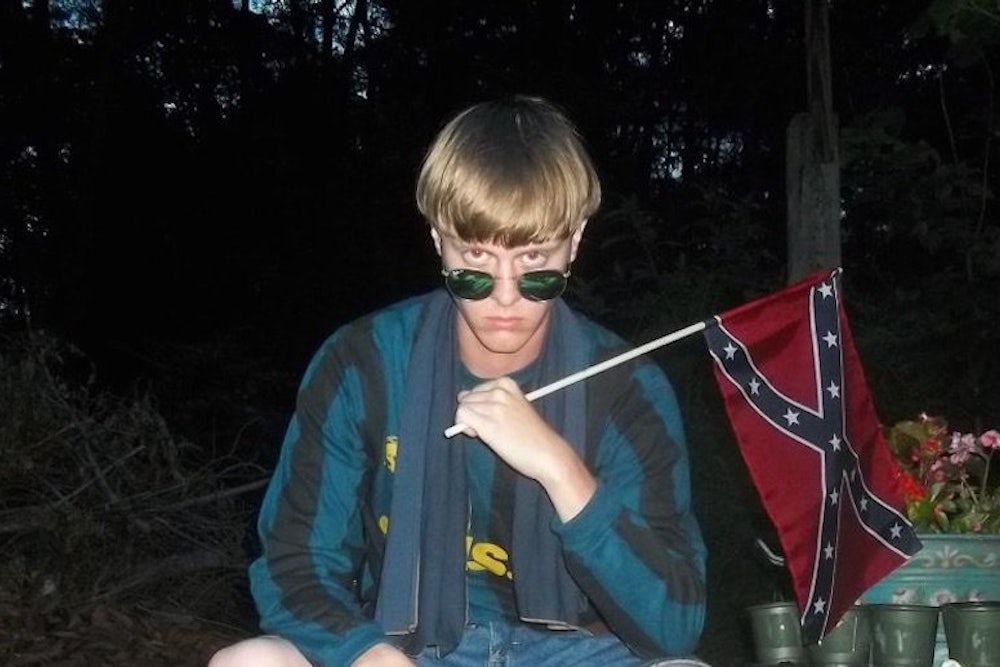That Republican presidential candidates can’t bring themselves to state clear opinions about the confederate flag flying on the grounds of the South Carolina capitol is an old phenomenon, revived most recently by last week’s mass killing at Emanuel AME church in Charleston. The issue has never really gone away because the South Carolina legislature has refused to remove the flag, and has thus allowed the controversy to simmer between presidential primaries (over which South Carolina has outsize influence). When Scott Walker says “the placement of a Confederate flag on the Capitol grounds is a state issue,” he’s doing his best not to upset white South Carolina conservatives, many of whom venerate the flag and the Confederacy itself. Governor Nikki Haley's decision to recommend the flag be removed can be seen as both the right thing to do and a strategic attempt to save Republican candidates from themselves.
But even if too many southern whites celebrate the Confederacy, surely most do not celebrate murdering black people en masse. It’s thus perplexing to watch Republicans stumble over not just the Confederate flag issue, but the question of whether the killings—perpetrated by a segregationist seeking to ignite a race war—were motivated by racism. As easy as it is to assume that the two phenomena are different manifestations of the same, pandering reflex, as Dr. Ben Carson did in this USA Today op-ed, it's much likelier that the willful blindness to Dylann Storm Roof's racism is an outgrowth of a different defensive posture altogether.
Carson, one of the lone voices of clarity in the GOP field on the simple fact of Roof's racism, used his column to shame his fellow candidates: “[W]hen a guy who has been depicted wearing a jacket featuring an apartheid-era Rhodesian flag walks into a historic black church and guns down nine African-American worshipers at a Bible study meeting, common sense leads one to believe his motivations are based in racism,” Carson wrote. “If this were a medical disease, and all the doctors recognized the symptoms but refused to make the diagnosis for fear of offending the patient, we could call it madness.”
But what’s the source of this madness? In Carson’s telling, “[T]here are people who are claiming that they can lead this country who dare not call this tragedy an act of racism, a hate crime, for fear of offending a particular segment of the electorate… To some, calling the events in Charleston, S.C., a hate crime reinforces a stigma, which they have fought hard to put behind them.”
This story is compelling because it’s so familiar. If Carson’s right then the Republican candidates’ reluctance to call out the most obvious kind of racism isn’t so different from the Confederate flag copout—a lazy and cowardly pander to a powerful but isolated constituency. To believe this, though, one must first suppose there’s a large constituency of Republican voters who will take umbrage at those who say Dylann Storm Roof was motivated by racism. You can take a pretty dim view of the Republican party’s racial thinking and still think this is extremely unlikely—that the number of people who hold incorrect and offensive views about the Confederacy is much, much larger than the number of people who would object to calling Roof a racist.
If that’s true, then there must be another explanation, and I believe it’s this: Republicans are reluctant to attribute anything serious in American society to racism, because so many Republican dogmas are premised on the notion that racism has been all but wiped out in America.
If we are theoretically equal under the law, and if expressing racist views in public is anathema in most places, then surely the government should no longer be intervening to protect minorities from phantom racists. This supposition animates Republican opposition to voting rights reforms, race-based affirmative action, welfare policy and, most especially, to federal monitoring of rightwing hate groups. But if racism is a severe enough problem in America to inspire white terrorism, then the spectrum might also include disenfranchisement, hiring bias, economic deprivation and any number of other non-violent, or subtle forms of discrimination. Republicans are trying to close the door on that question, because as long as it's open, it thrusts key facets of the conservative policy agenda into heated debate.
In that sense, an inability to detect racism in Roof’s massacre is less akin to mealy-mouthed defenses of Confederate flag worship than to the climate denying Republican's much-mocked disclaimer, “I’m not a scientist.” A studied ignorance designed to prevent the political debate from entering uncomfortable terrain. Acknowledge the climate consensus, or the existence of racist violence, and suddenly you’re stuck in the realm of arguing over what to do about it.
Both responses have the unwanted effect of making those who invoke them seem ridiculous. But “I’m not a scientist” at least allows Republicans to straddle a line between industrialist policy and outright climate deniers, who are a potent force in the party, but politically disfavored in the country as a whole. By contrast, blinding themselves to Roof’s racist motives offers little protection from the national debate about race in America, and at the same time makes them seem a little to concerned about the sensibilities of violent racists for comfort. This is why several Republicans have already taken a mulligan on the question of Roof's motives, and why I suspect all of them will before too long.
